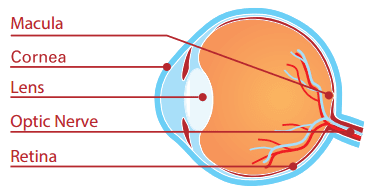by: Harry- Ocushield
In a fast-changing digital world, it’s hard to ignore the immense conveniences that come with developments. Overwhelming amounts of information are at the palm of your hands, you can have a real-time conversation with somebody on the opposite side of the world and you can even receive goods and services without setting a foot outside the door! However, these wonderful benefits come at a high price – jeopardizing your health. According to The Vision Council, more than 6 in 10 adults spend 5 or more hours on their digital devices every single day! Consequently, a lot of patients nowadays complain to doctors about eye fatigue and having a difficult time catching sleep. Could it be a coincidence? I think not! Emerging research evidence is pointing an accusing finger at blue light from electronic digital devices.
What is Blue Light?
Blue light is a High-Energy Visible light that is emitted naturally by the sun and artificially by digital devices such as smartphones, computers, LED television screens and LED fluorescent light bulbs. The sun has both ultraviolet light which is invisible and visible light which appears as white light. Visible light has a spectrum that constitutes all the colours of the rainbow. Blue light is one of those colours and it has the shortest wavelength and the highest energy content hence the name, HEV light.
Blue light from the sun is beneficial and it’s responsible for keeping you alert, boosting your moods and cognitive functions. However, the body was not meant to be exposed to blue light at night so that’s why exposure to artificial sources is detrimental to your health.
How Does Blue Light Cause Eye Fatigue
The eye’s cornea and lens are adapted to blocking ultra-violet rays. That is not so for blue light; it can penetrate right through the cornea and lens and reach the retina which is very sensitive to blue light. Staring at a screen for a long time will lead to eye fatigue which is a condition known as digital eye strain.
Optometrists describe digital eye strain as a group of eye and vision-related problems that result from prolonged use of digital devices. Its symptoms include sore, dry and red eyes, blurry vision, headaches, and neck pains. The condition is made worse by the fact that most people use smartphones and computers very close to their faces.
If exposure of blue light at night goes on for too long, it could lead to macular degeneration. This is a disease where the macula (centre of the retina) that is responsible for clear vision is interfered with. This leads to blurry vision or worse, blindness.
How Does Blue Light Cause Sleep Loss?
The circadian rhythm or the body’s internal clock is regulated by blue light from the sun. At night, the lack of blue light signals the brain to trigger the secretion of melatonin, a hormone that helps you sleep. Once it’s released into the bloodstream, body temperature starts dropping and you are lulled to sleep.
In the morning, blue light from the rising sun penetrates the eye where the photosensitive receptor melanopsin signals the brain to halt melatonin production. The body temperature then rises and your body begins to wake up.
When you continue to use digital devices at night or are exposed to bright LED light, blue light from them confuses the brain. The brain continues to think its day time so melatonin production is suppressed and you remain alert. This shifts the normal circadian rhythm which usually 24 and a quarter hours to slightly longer. The result is that you’ll have a hard time falling asleep as well as staying asleep.
How Do You Reduce the Effects of Blue Light?
Use Screen Protectors with Blue Light Filters
Screen protectors are physical blue light filters that are placed on smartphones, laptops or computer screens. They are designed to block all or part of blue light produced by the screen depending on which one you choose. Smartphone screen protectors also protect against scratches and breakages. Some computer screen protectors even have the privacy screen feature to hide what you’re doing from nosy people.
Use Blue Light Filtering Glasses
Blue light filtering glasses are specialized eyewear that block out or absorb blue light. They are designed to block a specific wavelength light range so make sure you have one that covers at least 455nm range.
Use Software Filters
Software blue light filters like Night Shift and F.lux are simply turned on at night to filter out blue light. It gives the screen a yellow tinge. You can manually put it on and off or set the times that it can automatically turn on and off.
Keep Your Distance
Sit at least an arm’s length away from the screen to keep such direct blue light from your eyes.
For all your blue light filter needs, Ocushield provides a variety of high-quality products including screen blue light filters and blue light filtering glasses. Visit us today and save yourself expensive trips to the doctor’s office.
This article was presented to the Macular Degeneration Association. Please ask for permission to use it.
From Prevent Blindness:
How Does Blue Light Affect the Eyes?
Almost all visible blue light passes through the cornea and lens and reaches the retina. This light may affect vision and could prematurely age the eyes. Early research shows that too much exposure to blue light could lead to:

Digital eyestrain: Blue light from computer screens and digital devices can decrease contrast leading to digital eyestrain. Fatigue, dry eyes, bad lighting, or how you sit in front of the computer can cause eyestrain. Symptoms of eyestrain include sore or irritated eyes and difficulty focusing.
Retina damage: Studies suggest that continued exposure to blue light over time could lead to damaged retinal cells. This can cause vision problems like age-related macular degeneration.
Source: Ocushield https://www.ocushield.com/products/ Prevent Blindness https://preventblindness.org/blue-light-and-your-eyes/
